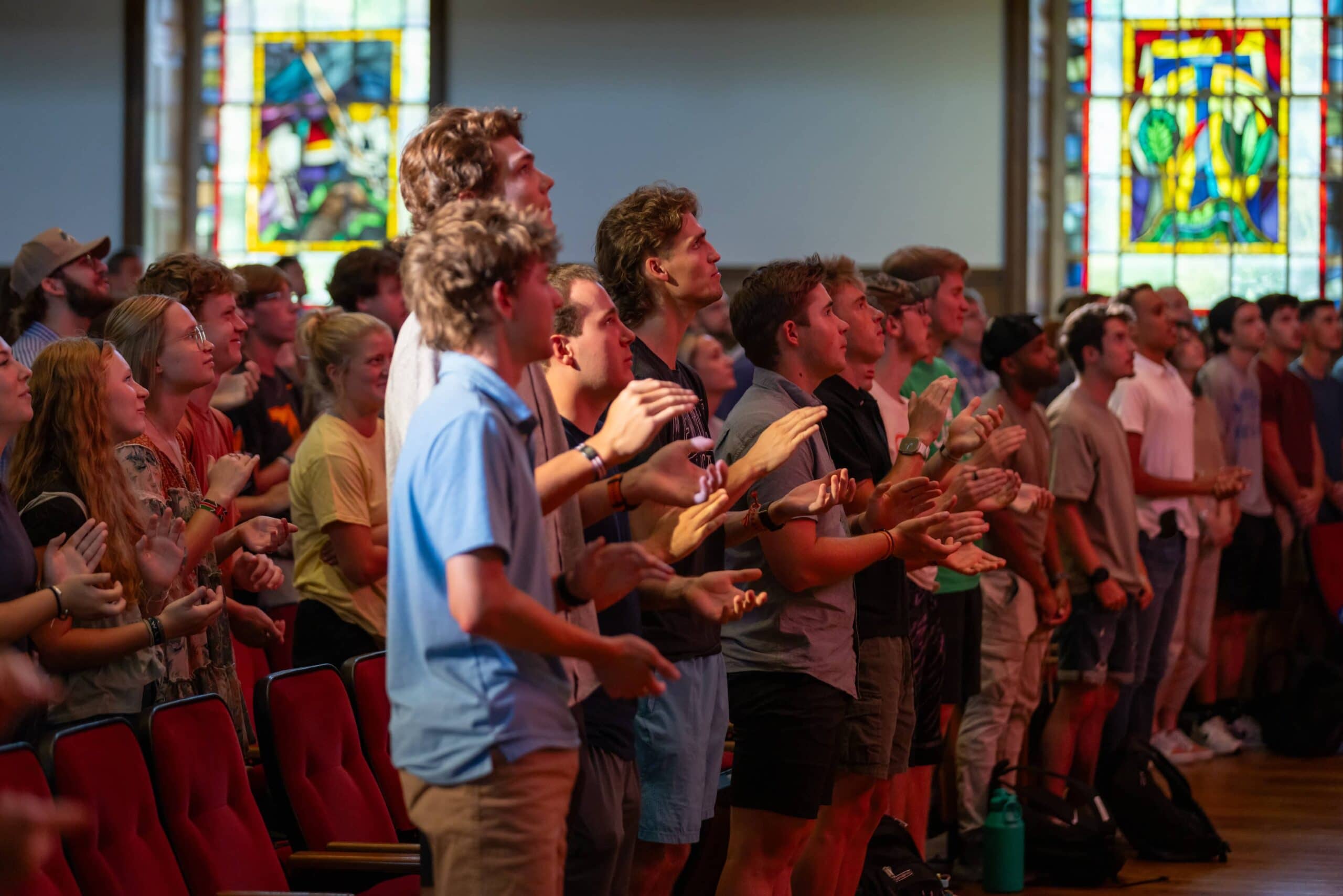Faith-Centered Theological Education at Emmanuel Christian Seminary at Milligan
At Emmanuel, theological education goes beyond academics, offering an opportunity for spiritual formation to enhance the theological studies degree. The Master of Theological Studies program focuses on building a comprehensive knowledge base while encouraging students to grow spiritually. By integrating academic study and personal growth, the program prepares students to make an impact in their communities and professional fields.
EMMANUEL CHRISTIAN SEMINARY, SCHOOL OF BIBLE & MINISTRY
MASTER OF THEOLOGICAL STUDIES (MTS)
Concentrations
Biblical Studies
The MTS with a concentration in Biblical Studies will allow students to complete a concentration with a combination of Old Testament and New Testament electives.
Church History
The MTS with a concentration in Church History is traditionally pursued by those planning further graduate studies in the field of church history. Church history is the study of the formation of Christian identity and ecclesial life in the light of the apostolic witness of the New Testament and the shaping influences of twenty centuries of history. It embraces both the story of the Christian faith as it has taken root in diverse historical and cultural settings and the actual development of the corporate life of the Church in both its particular and global manifestations. Thus, Church History is by nature a contextual and ecumenical theological discipline, with the constructive task of critically evaluating the church’s ongoing quest to embody Jesus Christ in the world through its community, ministry, theology, worship and sacraments, and spirituality and ethics.
Christian Theology
The MTS with a concentration in Christian Theology is traditionally pursued by those planning further graduate studies in the field of Christian theology. The Area of Christian Theology is most concerned with contemporary Christian theology as a discipline that attends to all aspects of Christian life under the triune God. The area draws upon the rich theological resources of the Christian tradition across cultures to respond to life’s persistent questions and spiritual conditions in ways that aspire to salvation, hope, and justice in the world. All disciplines of human understanding may be brought to bear on its questions.
Historical Theology
The MTS with a concentration in Historical Theology is traditionally pursued by those planning further graduate studies in historical theology at accredited institutions. Electives for this concentration can be Christian Theology or Church History courses. The Areas of Christian Theology and Church History are dedicated to the study of theology as central to Christian tradition while deeply engaging its historical and cultural contexts and implications for contemporary Christian life.
New Testament
The MTS with a concentration in the New Testament is traditionally pursued by those planning further graduate studies in the field. The New Testament area offers advanced study of the New Testament writings, their language, social-historical background, literary features, and theology. Courses in this area give attention to the Judaic and Graeco-Roman matrix of these writings, their religious teachings within their original contexts, and their theological unity and variety as part of the theological studies degree.
Exegesis of the text provides a foundation for the larger task of theological interpretation of the New Testament as sacred scripture. Courses emphasize the importance of understanding and appreciating the use of these documents throughout the church’s history and reading them afresh as Spirit-filled writings that continue to shape the Christian life corporately and individually.
Old Testament
The MTS with a concentration in Old Testament is traditionally pursued by those planning further graduate studies in the field of Old Testament. The Old Testament area offers advanced study of the books of the Hebrew Bible/Old Testament, including their text and language, social-historical background, literary character, and theology. The Deuterocanonical/Apocryphal books, Dead Sea Scrolls, and other important Jewish writings of the Second Temple period are also studied. Courses give attention to the ancient Near Eastern and later Hellenistic settings of the biblical books, their religious ideas and teachings within their original contexts, and their theological significance for the Christian faith.
Exegesis is emphasized as the foundation for the larger task of theological interpretation of the Hebrew Bible as Christian sacred scripture. Accordingly, courses in Hebrew language and exegesis are central, and courses in Aramaic, Ugaritic, and Akkadian are offered cyclically to complement the Old Testament area’s curriculum.
Career Paths with a Master of Theological Studies
Emmanuel’s Master of Theological Studies program graduates are prepared for career opportunities beyond traditional ministry roles. The interdisciplinary nature of theological education at an accredited theological seminary equips students with skills applicable to various professional fields.
Potential Careers
Archivist or Historian
Research and preserve religious or historical documents for libraries, museums, or academic institutions.
Nonprofit Administrator
Manage and lead faith-based or community organizations dedicated to social change.
Ethics Consultant
Provide ethical guidance in corporate, healthcare, or nonprofit sectors.
Cultural Advisor
Offer insights on religious and cultural dynamics for international organizations or governments.
Educator
Teach humanities, philosophy, or religious studies in secondary schools or community colleges.
Public Policy Analyst
Shape policy development through research and analysis of religious and ethical perspectives.
Emmanuel Faculty
Frequently Asked Questions
Who Is the Master of Theological Studies Program Designed for?
The Master of Theological Studies program at Emmanuel is crafted for individuals seeking a deeper understanding of theology and its application across various fields. It’s an excellent fit for those interested in advanced academic research, professional careers in ethics, education, community leadership, or anyone wanting to enrich their spiritual lives. Students come from diverse backgrounds and professions, united by a desire to engage with theological ideas in meaningful ways. The program welcomes those preparing for doctoral studies, mid-career professionals seeking growth, and individuals passionate about the intersection of faith and society.
Can I Customize My Studies To Focus On Specific Areas of Theology?
Yes, the Master of Theological Studies program at Emmanuel offers the flexibility to specialize in areas that align with your interests and goals. Students can focus on Biblical Studies, Christian Theology, Church History, Historical Theology, New Testament, or Old Testament. This customization allows you to tailor your academic journey each semester, ensuring you gain the expertise needed for your intended path, whether academic, professional, or personal. The program’s design ensures that students receive a well-rounded theological education that equips them for various roles while specialization is available.
How Is the Program Structured for Flexibility?
Emmanuel’s Master of Theological Studies program is structured to accommodate different schedules and commitments, making it accessible for those holding a bachelor’s degree. The program offers full-time and part-time options, ensuring that working professionals and students balancing personal responsibilities can achieve their academic goals. This flexibility allows students to progress at their own pace while benefiting from Emmanuel’s supportive learning environment, small class sizes, and personal faculty mentorship. The format is in-person, fostering collaboration and deeper engagement with faculty and peers.
What Resources Are Available To Help Me Succeed in This Program?
Students in the Master of Theological Studies program can access exceptional resources to support their academic and spiritual development. These include mentorship from experienced faculty, theological research opportunities at Emmanuel Christian Seminary, and access to Emmanuel’s extensive library. The program also benefits from small class sizes that encourage personalized guidance and collaboration. Beyond academics, Emmanuel offers a vibrant campus life with opportunities for community involvement, spiritual growth, and networking, ensuring students feel supported throughout their journey.
What Are Some Career Paths for MTS Graduates Outside of Traditional Ministry Roles?
Graduates of the Master of Theological Studies program are prepared for impactful careers in various fields. Some options include becoming a nonprofit administrator managing faith-based organizations, an ethics consultant advising on moral issues in corporate or healthcare settings, or a public policy analyst shaping decisions with a theological perspective. Other paths include working as an educator in humanities or religious studies, serving as a community development specialist creating programs to address social needs, or contributing as a writer focused on theology and culture. The program’s interdisciplinary approach ensures that graduates are equipped for diverse roles requiring critical thinking and ethical reasoning.
How Does the MTS Program Prepare Me for Further Academic Work?
The Master of Theological Studies program provides a strong foundation for advanced academic pursuits. With rigorous coursework in areas like Biblical Studies and Theology, students develop essential research and analytical skills. The program encourages engagement with theological scholarship and critical discussions, fostering intellectual depth and scholarly confidence. Graduates are well-prepared to pursue doctoral programs or contribute to academic discourse in theology and related fields. Emmanuel’s emphasis on academic rigor and spiritual growth ensures students are equipped for valuable academic contributions in their divinity school journey.
Are There Scholarships or Financial Aid Options for MTS Students?
We offer a variety of financial aid opportunities for Master of Theological Studies students. These include scholarships, grants, and loans tailored to support graduate education in a two-year MTS degree program. Prospective students are encouraged to connect with Milligan’s financial aid office for personalized guidance on the application process and available options. The university is committed to making high-quality theological education accessible and works closely with students to address their financial needs. More information on enrollment can also be found our Scholarships webpage.










